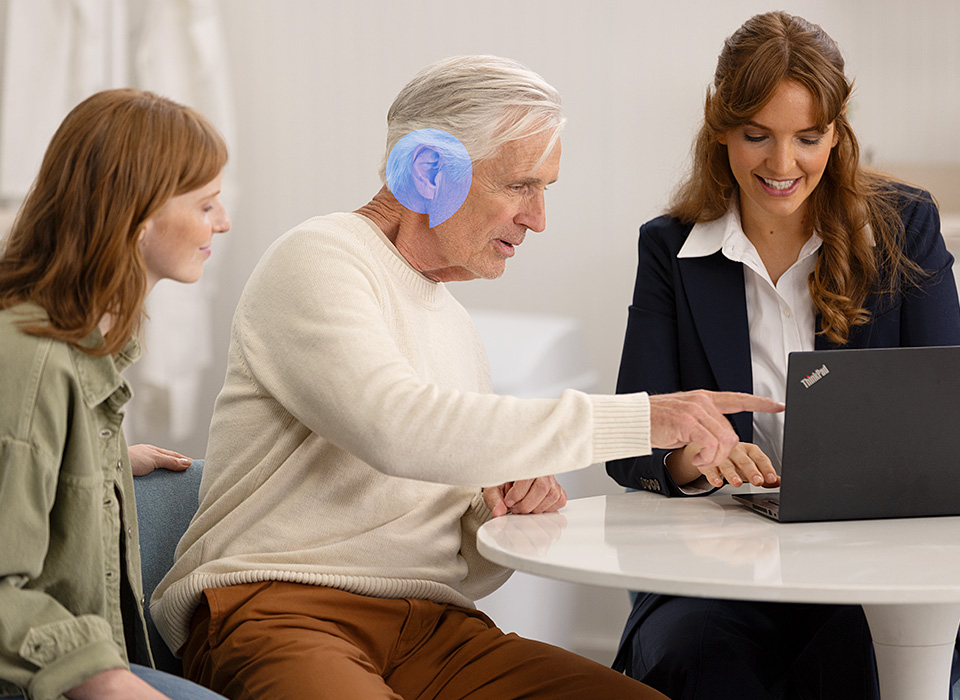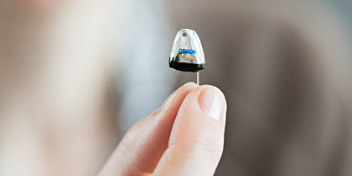Many of our hearing centres are open over Christmas. Check your local centre's opening hours and book your appointment here. Customer service & booking teams will be open on reduced hours.
Causes of hearing loss

What are the common causes of hearing loss in adults?
Hearing loss can result from a variety of factors, including aging, noise exposure, infections, genetic conditions, and certain medications. It can also be caused by head injuries, and even conditions like earwax buildup or perforated eardrums can lead to temporary hearing loss.
Some of the most common causes of hearing loss include:
- Ageing
- Excessive noise exposure
- Injury
- Viral infections (such as measles or mumps)
- Ear wax build-up
- Ototoxic drugs (medications that damage hearing)
- Genetics
Hearing loss can occur at any time during your life. You can benefit from getting your hearing checked by one of hearing care experts, no matter what has caused your hearing loss.

Self-assessment: Do I need a hearing test?
Just answer the four questions below to see whether you should consider getting a hearing test.
Your Result:
You would benefit from a hearing test
Your answers indicate that you experience symptoms of hearing loss. We strongly recommend booking a hearing test in one of our clinics.
The result is an indication. An in-person hearing test can determine if you have a hearing loss.
Book your free hearing test:
Your Result:
It seems you’d benefit from a hearing test
Your answers indicate that you experience some symptoms of hearing loss. We recommend booking a hearing test in one of our clinics.
The result is an indication. An in-person hearing test can determine if you have a hearing loss.
Book your free hearing test:
Your Result:
It cannot be determined whether you’d benefit from a hearing test
Your answers do not indicate that you experience symptoms of hearing loss. However, if you experience trouble hearing, we recommend booking a hearing test in one of our clinics.
The result is an indication. An in-person hearing test can determine if you have a hearing loss.
Book your free hearing test:
Age-related hearing loss (presbycusis)
Age is the single biggest cause of hearing loss. Changes in the inner ear occur naturally as we grow older. Genes and loud noise can also play a big role. When your hearing starts to weaken, it becomes more difficult to:
- Hear soft voices
- Hear high-frequency sounds (voices of children and women)
- Follow conversations when there's background noise
Because the loss is gradual, you may not realise that you’ve lost some of your hearing ability.

Noise-induced hearing loss
Repeated exposure to high levels of noise is another common cause of hearing loss. If you're exposed to loud noise for too long, the sensitive hair cells in the inner ear become damaged, and your ability to hear clearly can be affected.
Some people have a higher risk of developing noise-induced hearing loss if they're exposed to loud noise in their work environment (e.g. military personnel or musicians). Listening to excessively loud music at live concerts (or through headphones) can also cause hearing damage. There are things you can do to help prevent hearing loss.

Congenital hearing loss
Congenital hearing loss is a specific hearing loss cause. It means that a baby is born with hearing difficulties. The baby's hearing loss can be caused by either genetic defects, infections during pregnancy or low birth weight.
When compared to all causes of hearing loss, congenital hearing loss is quite rare: less than 1% of babies are born with hearing loss.

Protect your ears in loud environments

Did you know?
Today’s hearing aids are more technologically advanced and smaller than ever.
Some of them are practically invisible but still offer excellent sound quality – even in difficult listening situations.
Others can also be connected to your smartphone (or other smart devices) so you can stream sound directly into your hearing aids.

Treatment options for hearing loss
Regardless of the cause of your hearing loss, there is help available.
Understanding the source of your difficulties gives our experts insight into your needs.
While there's a wide range of possible causes and treatments for hearing loss, most hearing loss cases are treated with hearing aids.
Hearing loss causes FAQs
Sources
1. https://www.babyhearing.org/genetic-hearing-loss-faq
2. https://medlineplus.gov/ency/article/003044.htm







